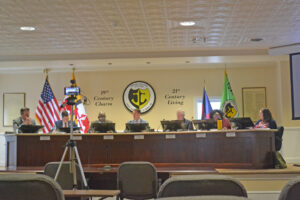
BERLIN – Concerns about employee pay highlighted a discussion of Berlin’s budget this week.
On Monday, the town hosted a first reading of its proposed fiscal year 2024 budget. While council members expressed frustration that the town wasn’t able to do more for its employees, Mayor Zack Tyndall said the spending plan was a step in the right direction.
“I really think when we look at the 67 pages of this budget and the countless line items that are here it’s a really good team effort,” he said. “I think we’re putting a solid foot forward here for the people we represent.”
For the past several weeks, town officials have been discussing ways to eliminate a more than $300,000 shortfall in the coming year’s proposed budget. In introducing the budget this week, Tyndall said some decreases in spending had occurred because grants had not been received and so would not require matching commitments from the town. The playground grant the town sought from Maryland’s Department of Natural Resources, for example, was unsuccessful. As a result, the town will not need to spend the associated $55,000 in matching funds.
He said in an effort to balance the budget he was also proposing the town increase salaries to 35% of the market rate. Until now, the town has been working with PaypointHR to determine how to bring staff salaries up to 50% of the market rate. Tyndall said that while this budget included smaller salary increases, it also included a 2.25% cost-of-living adjustment (COLA) for all employees.
“I think we’ve all discussed wanting to hit 50% of market rate but we’ve also discussed that may not be feasible this year,” he said. “I think we’re all on the same page with that. I think asking PaypointHR to keep that as a goal of the town is a good thing but to ask them to use for their calculations 35% of market rate so we can get a final report.”
Councilman Jay Knerr said he was frustrated that employee compensation had often been the final piece of the budget process.
“In past years, at least since I’ve been on the council, it just seems like we’ve been throwing darts at the wall trying to determine how much we should increase employees’ pay,” he said. “It’s just not a good way to do things. So this is the first time we’ve done a pay study like this and we have a solid path going forward to bring employees to where they need to be.”
While 35% of the market rate is not ideal, Knerr said it was a step forward.
Councilman Dean Burrell said the town’s citizens had a dedicated staff serving them. He said that despite Knerr’s comments he felt the council had again considered the needs of staff last.
“That just irks me terribly,” Burrell said. “Because if we’re going to be in this business of providing services to the citizens, we don’t do it. It’s those folks on those tractors. It’s those folks on those trash trucks. It’s those folks driving the police cars. It’s those folks taking our bills downstairs. I wish with my entire being that we could do more this year but folks going forward I don’t want to see us in this position again where we’re considering the needs of our staff last.”
Tyndall said in his very first budget meeting with staff he’d advised them he was setting aside $200,000 to implement the findings of the pay study.
“I helped do that all through this process,” he said. “I think we have done a good job of putting our human capital forward as a priority.”
Burrell said $200,000 was not enough and that he’d been amazed it was able to fund the COLA and the increased salaries.
Tyndall credited staff with working to review the figures to get the town to that point.
“I really thank our human resources director and our finance director who had to crunch these numbers a million times to get here,” he said.
When Councilman Jack Orris asked if the utilities would also be able to afford the pay increases proposed, staff confirmed that there was sufficient funding.
Councilman Steve Green said officials had known for the last several weeks the town was facing a shortfall and the budget would not represent an ideal outcome.
“It’s a discouraging situation to be in,” he said. “I feel like we’re trying to fix something that’s been many years in the making.”
He pointed out that years with no cost-of-living adjustment or a very small adjustment had led to the current staff being paid below market rate. He said that once the council approved a step and grade system, elected officials wouldn’t have to worry about pay beyond setting the amount of the annual COLA. He added that he liked the idea of the budget including a cost-of-living adjustment as well as money to bring salaries closer to market rate, since not every employee’s salary would be impacted by the market rate increase.
“I’d like to see the COLA be higher but I’m willing to accept it,” he said.
Councilwoman Shaneka Nichols said she too was frustrated with the situation but had known this was going to be a challenging budget yet.
“This is tough,” she said. “I don’t have a crystal ball.”
Berlin officials began budget work sessions last month, facing a more than $300,000 shortfall in the $11 million budget. A public hearing on the newly adjusted budget is set for June 12.

